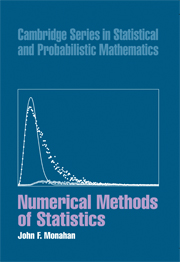Book contents
- Frontmatter
- Contents
- Preface
- 1 Algorithms and Computers
- 2 Computer Arithmetic
- 3 Matrices and Linear Equations
- 4 More Methods for Solving Linear Equations
- 5 Regression Computations
- 6 Eigenproblems
- 7 Functions: Interpolation, Smoothing, and Approximation
- 8 Introduction to Optimization and Nonlinear Equations
- 9 Maximum Likelihood and Nonlinear Regression
- 10 Numerical Integration and Monte Carlo Methods
- 11 Generating Random Variables from Other Distributions
- 12 Statistical Methods for Integration and Monte Carlo
- 13 Markov Chain Monte Carlo Methods
- 14 Sorting and Fast Algorithms
- Table of Programs and Demonstrations
- Author Index
- Subject Index
11 - Generating Random Variables from Other Distributions
Published online by Cambridge University Press: 21 March 2011
- Frontmatter
- Contents
- Preface
- 1 Algorithms and Computers
- 2 Computer Arithmetic
- 3 Matrices and Linear Equations
- 4 More Methods for Solving Linear Equations
- 5 Regression Computations
- 6 Eigenproblems
- 7 Functions: Interpolation, Smoothing, and Approximation
- 8 Introduction to Optimization and Nonlinear Equations
- 9 Maximum Likelihood and Nonlinear Regression
- 10 Numerical Integration and Monte Carlo Methods
- 11 Generating Random Variables from Other Distributions
- 12 Statistical Methods for Integration and Monte Carlo
- 13 Markov Chain Monte Carlo Methods
- 14 Sorting and Fast Algorithms
- Table of Programs and Demonstrations
- Author Index
- Subject Index
Summary
Introduction
Chapter 10 provided an overview of Monte Carlo methods and dealt solely with the problem of generating from the uniform distribution. Since the uniform distribution is the fundamental distribution, we're now prepared to deal with the postponed problem of generating from other distributions. Given the results of Chapter 10, this problem should be viewed as transforming a source sequence of IID uniform random variables {Ui} to an IID sequence of random variables {Xi} with cumulative distribution function (cdf) F. A discussion of general methods for generating from continuous distributions forms Section 11.2. Specific algorithms designed for various distributions, such as the normal and Student's t, follow in Section 11.3. General methods for discrete distributions are discussed in Section 11.4, with specific cases in Section 11.5. Special problems, including random sampling from a population, are handled in Section 11.6. The problem of accuracy in Monte Carlo is tackled in Section 11.7.
Some general remarks are in order before pursuing the problem at hand. Algorithms for generating random variables should always be simple, fast, and exact. Simplicity is paramount, since users must often code and debug their own programs. Finding errors in random output is very difficult (see Exercises 11.14 and 11.20). If an algorithm is simple, most mistakes will bring consequences so severe that the error can be easily discovered. Speed is not so important, since the computational effort in generation is usually only a small fraction of the total effort in the Monte Carlo experiment.
- Type
- Chapter
- Information
- Numerical Methods of Statistics , pp. 279 - 318Publisher: Cambridge University PressPrint publication year: 2001



